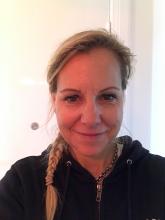I received my PhD in Germanics in 2008 and worked for many years as a part-time lecturer at both the Bothell and the Seattle campus of the UW, teaching philosophy, literature and intellectual history. As part of the UW summer study abroad program I brought students to Berlin for an experiential course on Jewish Berlin entitled, Berlin Beyond the Wall.
Then, last summer, we packed our bags and moved to Berlin! After a year of adjusting to life in Germany (on the one hand, rules and bureaucratic process for everything; on the other hand, no potholes with their own zip code), I am busy studying for an additional Masters, this one in Holocaust Communication and Jewish Studies. The Masters will complement my doctorate in Germanics from the UW: It allows me to broaden my teaching repertoire to include 18th to 20th century German literature and intellectual history as well as topics such as representations of the Holocaust and Jewish studies. As part of the praxis-oriented degree, I helped curate an exhibit, entitled, Pioneers of Holocaust Research. It was done in collaboration with the Gedenkstätte Haus der Wannsee-Konferenz as well as the Wiener Library in London, and it is currently showing at the Lichthof of the Auswärtiges Amt in Mitte. The reception was opened by Staatsminister Müntefering and attended by over 200 people. At the end of February it will travel to London before it will hopefully head to NYC. Press coverage included articles in the Frankfurter Allgemeine, Die Jüdische Allgemeine, and two interviews featuring a colleague and myself, that aired on several German radio stations (NDR, DLF, BBR).
Literature and philosophy are never far from my mind, so I am dedicated to writing and research, and I aim to edit my dissertation for publication by next year. To that end, I have finished two topically related articles. One of them discusses the anthropological turn in Lessing’s Sara Sampson, which will be published in the Lenz-Jahrbuch later this year. The other article examines the pre-lingual eidetic forms of dream images in Kant via Husserl. It is under review at Scientia Poetica. Leaving 18th century literature behind for 20th and 21st century German literature, I have also finished an article on Schlink’s Der Vorleser, which is submitted and under review. Currently, I am studying the relation between thought, language and the capacity for evil in Hannah Arendt’s later work. In an effort to stay abreast in the field of Germanics and Jewish studies, I enjoy writing reviews. I just finished one by a Germanics scholar who wrote on contemporary Austrian literature film and art in response to Nazism and anti-Semitism. Another review discusses a newly published volume of 18 collected essays that examine Jewish resistance in Europe during 1933-1945.
I miss the interaction with colleagues and students, and I am always on the look-out for teaching engagements.
During the first year in Berlin, it was good to see the UW Germanics department represented here so well: Mentors and Doktorvater Sabine Wilke and Rick Gray were here on a grant, and it was fun to catch up and hear about all things Seattle. It made the transition of moving here a bit easier. Fortunately, alumna Prof. Anke Biendarra was also here at the tail-end of her three year stay in Berlin. Our dogs ran around off-leash in the greater parks of Berlin while we discussed the benefits and draw-backs of European vs. American way of life. My former student Kelly Miller has been living in Berlin for several years, and it has been wonderful to catch up fairly regularly. In short, Berlin seems to draw quite a few people from the UW Germanics department. So—who’s next?
Greetings from the capital, Nicole Calian
